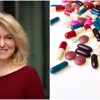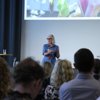Fritextsökning
Artiklar per år
Innehållstyper
-

Medivir CEO on upcoming study: ”It's about working together with others”
Medivir is a small company with a big task: to take its drug candidate, via extensive clinical studies, all the way to a patient group that currently lacks approved treatment alternatives. "We can't do that on our own – our entire R&D activities
-

Drug development booms in Medicon Valley
When it comes to developing new medicines, the Öresund region is one of the top performers in the EU. Companies working on commission for pharmaceutical companies are highlighted as a success factor. “Everyone has heard of Novo Nordisk, but these companies are unknown to people outside the industry despite being the golden vein of the life science sector,” says Anette Steenberg, CEO of the cluster organisation MVA.
-

Lilly´s Nordic manager on Mounjaro launch in Sweden: "Patients deserve respect"
Another blockbuster diabetes and obesity drug has made its way into the Swedish market – with promises of a stable supply and availability for patients. “What we see is a significant unmet need, so we are expecting to have quite a good welcoming in the market", says Daniel Lucas, Managing Director Nordic Countries at the American pharmaceutical giant Eli Lilly.
-

A new life science cluster formed – “We are very strong in talent”
Stockholm and Uppsala’s joint life science cluster aims to be among the best in Europe. Pontus Holm, Life Science Coordinator for Region Stockholm, says the decision to create a joint profile for the two cities is strongly supported. He mentions that around 50 stakeholders were asked last winter if they were in favour of a joint cluster and that “the answer was a resounding yes”.
-

An increasing number of people are falling ill with TBE – “Much more research is needed”
Tick-borne meningitis, or TBE, is an increasingly common disease in Sweden. Currently, there is a vaccine against the disease but no drugs. Researcher Anna Överby Wernstedt is studying the processes that occur in the brain during a TBE infection and hopes to contribute to developing a treatment.
-

From lab to patient – the art of developing new antibody therapies
For 25 years, Danish company Genmab has been developing antibodies and has managed to get several drugs all the way to the patient. Esther Breij has been along for much of the journey and has experienced setbacks, but also huge discoveries. “It’s amazing when you succeed,” she says.
-

Anna Törner: ”Mom, do you think you’ll ever get married again?”
”I realize I’m slowly descending into that familiar statistical rabbit hole, where life’s biggest uncertainties are reduced to point estimates and confidence intervals”, Anna Törner writes in a column.
-

“We should avoid surgery if we can”
Since February this year, she has been Scientific Director Life Science at the Karolinska Institutet. Life Science Sweden met Anna Martling for a talk about role models, surgery and Sweden’s strengths and weaknesses in medical research.
-

Artificial intelligence in radiology – “Risk prediction is very exciting”
A growing number of solutions based on artificial intelligence are being developed and used in healthcare. According to Sophia Zackrisson, Professor of Radiology at Lund University, radiology is a field that is well suited to the technology.
-

Anna Törner: Yes, I Am Sick, But Not Weak
”People often say that someone who is ill only has one wish—to get better. But I think that is not true. Someone who is ill also longs to be understood, to be respected, to not have their identity overshadowed by their condition”, writes Anna Törner in a column.
-

The investor: “The major common diseases are hot again”
She has previously been voted Investor of the Year and will now be moderating The Future of Swedish & Danish Life Science congress. We check the temperature of the industry with Nina Rawal from Trill Impact Advisory.
-

Nobel Prize winner Torsten Wiesel turns 100: “Old men like me should use their experience to help the young”
In 1955, a young Torsten Wiesel jumped on a boat to the US and embarked on a fabulous career as a neuroscientist, crowned with a Nobel Prize for his work. Now 100 years old, he looks back on an intense life and his upbringing in Stockholm, Sweden, which shaped his desire to help the vulnerable in society.
-

“Conducting research at universities is becoming more and more like working at a research hotel”
The government wants Swedish research to focus on excellence and innovation, but can the two be combined? Life Science Sweden talks to Anna Falk, a professor at Lund University, about research policy, the constant hunt for funding in academia and what constitutes ‘fine research’.
-

Samuel Lagercrantz: “Companies that do this successfully will take the lead”
The development of new medicines and medical technologies should not focus too narrowly on prolonging life. It is equally important to develop treatments that relieve pain or eliminate painful symptoms, writes Samuel Lagercrantz in an editorial.
-

Total pipeline of pharmaceutical companies reaches a record high – 22,921 medicines are currently being developed
Despite the difficult economic times, pharmaceutical companies have never developed as many new drugs as now.
-

Carl Borrebaeck – professor and serial entrepreneur with a taste for speed
Award-winning cancer researcher, the founder of many listed companies, and constantly in the academic and commercial spotlight for decades. However, Carl Borrebaeck, Professor of Immunotechnology at Lund, is not yet satisfied. “We have a new, potentially super exciting project in the pipeline,” he says.
-

Nocebo – the evil twin that makes you feel worse
The placebo effect is well known in healthcare, but not so its opposite: nocebo. “The effect is small, but it can have major repercussions,” says Uppsala researcher Charlotte Blease, co-author of a book on the phenomenon.
-

Study: Popular diabetes treatment is not associated with thyroid cancer
Concerns raised about an association between GLP-1 analogues, used to treat diabetes and obesity, and an increased risk of thyroid cancer are not supported by an extensive Scandinavian study.
-

Beta-blockers are often given unnecessarily, a study finds – “This will affect future practice”
Patients who have suffered a minor heart attack do not benefit from beta-blockers, according to a major new study that may change guidelines for cardiac care.
-

Settlement of cancer allegations against blockbuster drug
French pharmaceutical company Sanofi has reached a principal agreement in the US on around 4,000 of the cases in which its now withdrawn blockbuster heartburn drug Zantac allegedly had caused cancer.
-

”We need compatibility“
Penilla Gunther, founder of Fokus Patient and chair of the European Patient Safety Foundation, hopes that the forthcoming life science strategy will focus on efficient and secure management of patient data and equal access to medicines.
-

Venom from the deathstalker carries radiopharmaceuticals to the brain
In order to target cancerous brain tumours with radionuclides, the problematic blood-brain barrier must first be crossed. Life Science Sweden has visited a KI researcher who is trialling an unusual approach ‒ using scorpion venom.
-

Marie Gårdmark: ”Interchangeable biological medicines – soon in a pharmacy near you?”
”Generic competition is an effective way to push down drug prices, but it has not worked equally well for biosimilars. Biosimilars require more time to gain market share compared to generics, and new biosimilars do not always lead to lower prices” writes
-

“Don’t postpone the transition to IVDR”
Operators who have not yet started to adapt to the requirements of the new EU IVDR regulation are running out of excuses. This is the opinion of Helena Dzojic, Head of Unit at the Swedish Medical Products Agency, who continues to persistently spread her message: don’t postpone the transition.